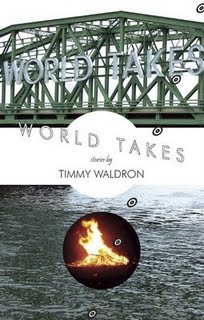
Word Riot, 102 p.
Reviewer: Tobias Carroll
Riding by rail from New York to Philadelphia brings you past New Jersey’s capital city, Trenton. As the train crosses the Delaware River, a phrase can be seen, written in tall metal letters on a parallel bridge: Trenton makes, the world takes. It’s from this slogan that Timmy Waldron has titled his debut collection, and it’s more apt than one might expect: the ambiguity of tone, the sense of broken expectations and meanings that have shifted over time. The thirteen stories in World Takes range in tone from humorous to wistful to apocalyptic. Yet what unites most of them is Waldron’s affection for his characters: whether an aging George Washington impersonator or a cocaine-fueled cubicle drone, Waldron’s treatment of his protagonists is respectful, understanding their flaws while still suggesting the prospect of redemption.
New Jersey and San Francisco supply the settings for most of these stories. Some, notably “Amanda” and “When It Was Good,” have the feeling of monologues, late-night confessions after vows of brutal honesty. Elsewhere, Waldron’s canvas is broader: “Sinjin’s Crossing,” for instance, focuses on the rivalry between two Washington’s Crossing re-enactors. Waldron sketches several absurd scenarios over the course of the story, but balances a realistic sense of place with light comedy and one neatly ironic payoff. “Before Floyd Hit” and “City Limits” are starker in their tone, explorations of circles of relationships in which emotional messiness begets more of the same.
Waldron’s sensibility here is refreshingly timeless: “Sinjin’s Crossing,” in particular, feels as though it could have been written at any time in the last forty years. (That’s meant as a compliment, for what it’s worth.) The only shift in tone that feels jarring comes close to the end, with “Sipping Soda In a Combat Zone”. It’s the story of Eliot and Vicky, a wealthy couple who rig a contest in order to, well, sip soda in a combat zone. At its heart is a fundamental (and understandable) outrage at the excesses of consumerism. The consequences of the exaggerated, satirical tone used here, however, are that Vicky and Eliot never emerge as sympathetic or particularly interesting, making an ending that should sting instead land with little impact.
If I seem to be focusing disproportionately on one story, I don’t intend to: my frustrations with “Sipping Soda in a Combat Zone” stem from the fact that it seems to lack the empathy and warmth Waldron demonstrates so well in the other twelve stories in this collection. “Stories designed to amuse,” reads the inside front cover, and in many ways, the best statement one can make about this collection is simply this: they do.
[Disclosure: Waldron is an editor at Word Riot, which published a short story of mine earlier this year. However, we had no direct contact until meeting at a reading in Brooklyn several months later.]

No comments